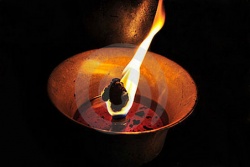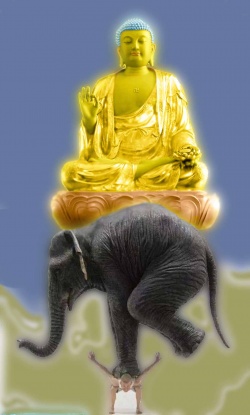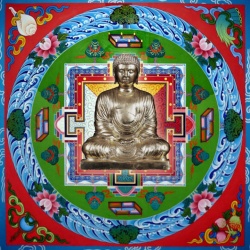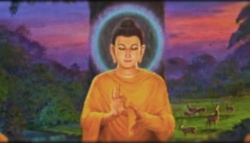Difference between revisions of "Eight Precepts in Theravada Buddhism by Bodhicarini Upasika Jayasili Jacquetta Gomes"
(Created page with "<nomobile>{{DisplayImages|482|4423|2022|1021|1170}}</nomobile> {{Centre|<big><big> Eight Precepts in Theravada Buddhism </big></big><br/> By Bodhicarini Upasika Jayasili Jac...") |
|||
| (3 intermediate revisions by the same user not shown) | |||
| Line 5: | Line 5: | ||
| − | The minimum requirements for a Theravada Buddhist are the Five Precepts (Panca Sila). | + | The minimum requirements for a [[Theravada]] [[Buddhist]] are the [[Five Precepts]] ([[Panca Sila]]). |
| − | Theravada Buddhism also offers two different versions of the Eight Precepts: | + | [[Theravada Buddhism]] also offers two different versions of the [[Eight Precepts]]: |
| − | : (i) Atthangika Uposatha Sila (Eight Uposatha Precepts) | + | : (i) [[Atthangika Uposatha Sila]] ([[Eight Uposatha Precepts]]) |
| − | : (ii) Ajivatthamaka Sila (Eight Precepts with Right Livelihood as the Eighth) | + | : (ii) [[Ajivatthamaka Sila]] ([[Eight Precepts]] with [[Right Livelihood]] as the Eighth) |
| − | The Eight Precepts are observed on the Uposatha Days (full moon, new moon and the two half-moon days). Lay people often wear white clothes and spend entire Uposatha days at the temple. Before the day’s activities begin, the presiding monk administers the Eight Precepts and after the day’s religious activities are over, administers the Five Precepts, thus releasing the devotee from the Eight Precepts. | + | The [[Eight Precepts]] are observed on the [[Uposatha Days]] ([[full moon]], [[new moon]] and the two half-moon days). [[Lay people]] often wear white [[clothes]] and spend entire [[Uposatha days]] at the [[temple]]. Before the day’s [[activities]] begin, the presiding [[monk]] administers the [[Eight Precepts]] and after the day’s [[religious]] [[activities]] are over, administers the [[Five Precepts]], thus releasing the [[devotee]] from the [[Eight Precepts]]. |
| − | ===(i) Atthangika Uposatha Sila (Eight Uposatha Precepts)=== | + | ===(i) [[Atthangika Uposatha Sila]] ([[Eight Uposatha Precepts]])=== |
| − | 1) Panatipata veramani sikkhapadam samadiyami<br/> | + | 1) [[Panatipata veramani sikkhapadam samadiyami]]<br/> |
| − | I undertake the rule of training to refrain from killing living beings; | + | I undertake the {{Wiki|rule}} of {{Wiki|training}} to refrain from {{Wiki|killing}} [[living beings]]; |
| − | 2) Adinnadana veramani sikkhapadam samadiyami<br/> | + | 2) [[Adinnadana veramani sikkhapadam samadiyami]]<br/> |
| − | I undertake the rule of training to refrain from taking what is not given; | + | I undertake the {{Wiki|rule}} of {{Wiki|training}} to refrain from taking what is not given; |
| − | 3) Abrahmacariya veramani sikkhapadam samadiyami<br/> | + | 3) [[Abrahmacariya veramani sikkhapadam samadiyami]]<br/> |
| − | I undertake the rule of training to refrain from non-celibate conduct; | + | I undertake the {{Wiki|rule}} of {{Wiki|training}} to refrain from non-celibate conduct; |
| − | 4) Musavada veramani sikkhapadam samadiyami<br/> | + | 4) [[Musavada veramani sikkhapadam samadiyami]]<br/> |
| − | I undertake the rule of training to refrain from false speech | + | I undertake the {{Wiki|rule}} of {{Wiki|training}} to refrain from [[false speech]] |
| − | 5) Sura – meraya – majja pamadatthana veramani sikkhapadam samadiyami<br/> | + | 5) {{LTSW|1Nr5}}[[Sura – meraya – majja pamadatthana veramani sikkhapadam samadiyami]]<br/> |
I undertake the rule of training to refrain from drugs and drink which tend to cloud the mind; | I undertake the rule of training to refrain from drugs and drink which tend to cloud the mind; | ||
| − | 6) Vikala bhojana veramani sikkhapadam samadiyami<br/> | + | 6) {{LTSW|1Nr6}}[[Vikala bhojana veramani sikkhapadam samadiyami]]<br/> |
I undertake the rule of training to refrain from taking food at an unseasonable time; | I undertake the rule of training to refrain from taking food at an unseasonable time; | ||
| − | 7) Nacca – gita – vadita – visuka – dassana – mala - gandha vilepana - dharana mandana vibhusanatthana veramani sikkhapadam samadiyami<br/> | + | 7) {{LTSW|1Nr7}}[[Nacca – gita – vadita – visuka – dassana – mala - gandha vilepana - dharana mandana vibhusanatthana veramani sikkhapadam samadiyami]]<br/> |
I undertake the rule of training to refrain from dancing, singing, music, and unseemly shows; from the use of garlands, perfumes, and unguents; and from things that tend to beautify and adorn [the person]; | I undertake the rule of training to refrain from dancing, singing, music, and unseemly shows; from the use of garlands, perfumes, and unguents; and from things that tend to beautify and adorn [the person]; | ||
| − | 8) Ucchasayana – mahasayana veramani sikkhapadam samadiyami<br/> | + | 8) {{LTSW|1Nr8}}[[Ucchasayana – mahasayana veramani sikkhapadam samadiyami]]<br/> |
I undertake the rule of training to refrain from using high and luxurious seats and beds. | I undertake the rule of training to refrain from using high and luxurious seats and beds. | ||
| − | ===(ii) Ajivatthamaka Sila (Eight Precepts with Right Livelihood as the Eighth)=== | + | ===(ii) [[Ajivatthamaka Sila]] ([[Eight Precepts]] with [[Right Livelihood]] as the Eighth)=== |
| − | 1) Panatipata veramani sikkhapadam samadiyami<br/> | + | 1) [[Panatipata veramani sikkhapadam samadiyami]]<br/> |
| − | I undertake the rule of training to refrain from killing living beings; | + | I undertake the {{Wiki|rule}} of {{Wiki|training}} to refrain from {{Wiki|killing}} [[living beings]]; |
| − | 2) Adinnadana veramani sikkhapadam samadiyami<br/> | + | 2) [[Adinnadana veramani sikkhapadam samadiyami]]<br/> |
| − | I undertake the rule of training to refrain from taking what is not given; | + | I undertake the {{Wiki|rule}} of {{Wiki|training}} to refrain from taking what is not given; |
| − | 3) Kamesu micchacara veramani sikkhapadam samadiyami<br/> | + | 3) [[Kamesu micchacara veramani sikkhapadam samadiyami]]<br/> |
| − | I undertake the rule of training to refrain from sexual misconduct; | + | I undertake the {{Wiki|rule}} of {{Wiki|training}} to refrain from [[sexual misconduct]]; |
| − | 4) Musavada veramani sikkhapadam samadiyami<br/> | + | 4) [[Musavada veramani sikkhapadam samadiyami]]<br/> |
| − | I undertake the rule of training to refrain from false speech; | + | I undertake the {{Wiki|rule}} of {{Wiki|training}} to refrain from [[false speech]]; |
| − | 5) Pisuna vaca veramani sikkhapadam samadiyami<br/> | + | 5) {{LTSW|2Nr5}}[[Pisuna vaca veramani sikkhapadam samadiyami]]<br/> |
I undertake the rule of training to refrain from backbiting; | I undertake the rule of training to refrain from backbiting; | ||
| − | 6) Pharusa vaca veramani sikkhapadam samadiyami<br/> | + | 6) {{LTSW|2Nr6}}[[Pharusa vaca veramani sikkhapadam samadiyami]]<br/> |
I undertake the rule of training to refrain from using harsh or abusive speech; | I undertake the rule of training to refrain from using harsh or abusive speech; | ||
| − | 7) Samphappalapa veramani sikkhapadam samadiyami<br/> | + | 7) {{LTSW|2Nr7}}[[Samphappalapa veramani sikkhapadam samadiyami]]<br/> |
I undertake the rule of training to refrain from useless or meaningless conversation; | I undertake the rule of training to refrain from useless or meaningless conversation; | ||
| − | 8) Micchajiva veramani sikkhapadam samadiyami<br/> | + | 8) {{LTSW|2Nr8}}[[Micchajiva veramani sikkhapadam samadiyami]]<br/> |
I undertake the rule of training to refrain from wrong means of livelihood. | I undertake the rule of training to refrain from wrong means of livelihood. | ||
| − | These precepts can also be taken on Uposatha days. In recent years the Sri Lankan Theravada Sangha (Buddhist monastic order) in the west have developed the use of the Ajivatthamaka Sila precepts for western lay practitioners. Some westerners expressed a wish to undertake these as a lifetime commitment in a ceremony conducted by a senior monk. | + | These [[precepts]] can also be taken on [[Uposatha days]]. In recent years the [[Sri Lankan]] [[Theravada Sangha]] ([[Buddhist]] [[monastic order]]) in the [[west]] have developed the use of the [[Ajivatthamaka Sila]] [[precepts]] for [[western]] [[lay practitioners]]. Some westerners expressed a wish to undertake these as a [[lifetime]] commitment in a {{Wiki|ceremony}} conducted by a [[senior monk]]. |
| − | The above article appeared in Buddhism Now, Volume 18 (2) (February, 2006) published by the BPG Buddhist Publishing Group, England UK. | + | The above article appeared in [[Buddhism]] Now, Volume 18 (2) (February, 2006) published by the BPG [[Buddhist]] Publishing Group, [[England]] UK. |
http://buddhismnow.com/ <br/> | http://buddhismnow.com/ <br/> | ||
| Line 79: | Line 79: | ||
[[Category:Eight Precepts]] | [[Category:Eight Precepts]] | ||
| + | [[Category:Bodhicarini Upasika Jayasili Jacquetta Gomes]] | ||
Latest revision as of 13:49, 3 April 2016
Eight Precepts in Theravada Buddhism
By Bodhicarini Upasika Jayasili Jacquetta Gomes BGKT Buddhist Group of Kendal (Theravada) England UK
Updated 31st August 2015
The minimum requirements for a Theravada Buddhist are the Five Precepts (Panca Sila).
Theravada Buddhism also offers two different versions of the Eight Precepts:
- (i) Atthangika Uposatha Sila (Eight Uposatha Precepts)
- (ii) Ajivatthamaka Sila (Eight Precepts with Right Livelihood as the Eighth)
The Eight Precepts are observed on the Uposatha Days (full moon, new moon and the two half-moon days). Lay people often wear white clothes and spend entire Uposatha days at the temple. Before the day’s activities begin, the presiding monk administers the Eight Precepts and after the day’s religious activities are over, administers the Five Precepts, thus releasing the devotee from the Eight Precepts.
(i) Atthangika Uposatha Sila (Eight Uposatha Precepts)
1) Panatipata veramani sikkhapadam samadiyami
I undertake the rule of training to refrain from killing living beings;
2) Adinnadana veramani sikkhapadam samadiyami
I undertake the rule of training to refrain from taking what is not given;
3) Abrahmacariya veramani sikkhapadam samadiyami
I undertake the rule of training to refrain from non-celibate conduct;
4) Musavada veramani sikkhapadam samadiyami
I undertake the rule of training to refrain from false speech
5) Sura – meraya – majja pamadatthana veramani sikkhapadam samadiyami
I undertake the rule of training to refrain from drugs and drink which tend to cloud the mind;
6) Vikala bhojana veramani sikkhapadam samadiyami
I undertake the rule of training to refrain from taking food at an unseasonable time;
7) Nacca – gita – vadita – visuka – dassana – mala - gandha vilepana - dharana mandana vibhusanatthana veramani sikkhapadam samadiyami
I undertake the rule of training to refrain from dancing, singing, music, and unseemly shows; from the use of garlands, perfumes, and unguents; and from things that tend to beautify and adorn [the person];
8) Ucchasayana – mahasayana veramani sikkhapadam samadiyami
I undertake the rule of training to refrain from using high and luxurious seats and beds.
(ii) Ajivatthamaka Sila (Eight Precepts with Right Livelihood as the Eighth)
1) Panatipata veramani sikkhapadam samadiyami
I undertake the rule of training to refrain from killing living beings;
2) Adinnadana veramani sikkhapadam samadiyami
I undertake the rule of training to refrain from taking what is not given;
3) Kamesu micchacara veramani sikkhapadam samadiyami
I undertake the rule of training to refrain from sexual misconduct;
4) Musavada veramani sikkhapadam samadiyami
I undertake the rule of training to refrain from false speech;
5) Pisuna vaca veramani sikkhapadam samadiyami
I undertake the rule of training to refrain from backbiting;
6) Pharusa vaca veramani sikkhapadam samadiyami
I undertake the rule of training to refrain from using harsh or abusive speech;
7) Samphappalapa veramani sikkhapadam samadiyami
I undertake the rule of training to refrain from useless or meaningless conversation;
8) Micchajiva veramani sikkhapadam samadiyami
I undertake the rule of training to refrain from wrong means of livelihood.
These precepts can also be taken on Uposatha days. In recent years the Sri Lankan Theravada Sangha (Buddhist monastic order) in the west have developed the use of the Ajivatthamaka Sila precepts for western lay practitioners. Some westerners expressed a wish to undertake these as a lifetime commitment in a ceremony conducted by a senior monk.
The above article appeared in Buddhism Now, Volume 18 (2) (February, 2006) published by the BPG Buddhist Publishing Group, England UK.
http://buddhismnow.com/
http://www.buddhistpublishing.com
Source
By Bodhicarini Upasika Jayasili Jacquetta Gomes BGKT Buddhist Group of Kendal (Theravada) England UK




